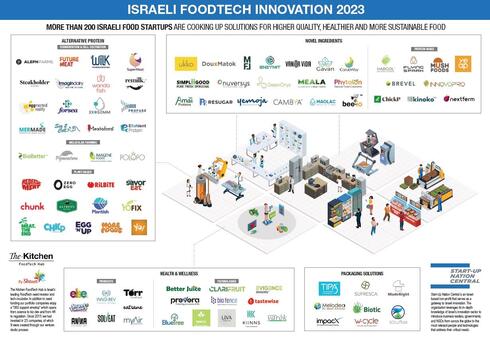
Mapping Israel’s foodtech sector
Many are suggesting the appetite is over for the foodtech meal. Israel is showing there’s a bigger thirst than ever
While the foodtech industry appears to be suffering from a slump, Israel has been determined to feed its ecosystem. The proof is in its investment pudding: 230 foodtech companies in Israel are currently utilizing the country’s strength as a startup nation in the sector.
For starters, the sector can boast more than $1.1 billion invested in Israeli foodtech companies in the last two years. 2021 saw $618 million and 2022 saw $473 million, the large majority of which went to alternative proteins, followed by novel ingredients. Between 2017-2022, a total of $1.4 billion was injected into the ecosystem.
While the absolute value of the investment fell by 23%, this is stronger than the 50% drop seen across all sectors. In fact, while all sectors have seen an overall 40% drop in the number of deals, the number of Israeli foodtech deals actually increased by 26%. It indicates that despite less money being invested into tech, the money that is being invested is being spread across smaller portions of companies in the alternative protein sector.
The result of dishing out such investment in foodtech means that “more than 200 Israeli food startups are cooking up solutions for higher quality, healthier, and more sustainable food,” according to Start-Up Nation Central. The non-profit organization promotes Israeli entrepreneurship and helps connect leaders in the sector with opportunities. It has provided CTech with a collection of companies across the spectrum of the sector: upstream companies that focus on Agtech all the way down to the downstream, which is focused on foodtech.
The sector receives government support from the likes of the Ministry of Health, the Ministry of the Economy, the Ministry of Science, Technology, and Space, and the Israel Innovation Authority. Accelerators and incubators include Fresh Start and The Kitchen. VCs and public market funds include JVP, OurCrowd, Hanaco, and Millennium Foodtech. Israel corporations such as Tnuva and Strauss have a hand in the ecosystem, as well as multinational corporations such as Pepsico, Nestle, and Unilever.
And let’s not forget the contributions from Israel’s academia, such as the Technion Israel Institute of Technology, Ramot Tel Aviv University, Weizmann Institute of Science, and the Hebrew University of Jerusalem.
Related articles:
Both in terms of the number of deals and amount of money, the alternative protein companies are clearly the main course. Companies like Aleph Farms, Wilk, SavorEat, Meat.The End, Remilk, Zero Egg, and More Foods are working on replacing meat and dairy in everyday foods. Last month CTech ate burgers and egg omelets provided by these companies during an expo in Tel Aviv. While not quite exact replicas of the dishes we know and love, most companies show clear potential as a legitimate alternative food source for those more conscious of their carbon footprints and bodily health.
A few weeks ago, CTech published an op-ed titled “Foodtech: the morally nutritious sector”. It came from the thesis that the sector offers inherently good opportunities: an improvement in animal welfare, it is environmentally friendly, and it can be more nutritious than processed foods currently found on our shelves.
Last year, we described 3D-printed burgers as “technically perfect, albeit creatively void” after a taste test. Today, improvements are being made to ensure mass-printed foods maintain a level of creativity among the dishes that make them popular to begin with. What good is a burger at a Michelin-star restaurant if it is printed the same way as a New York diner? As foodtech continues to evolve, these questions will be answered in the form of novel ingredients that will be replacing traditional ones.
Many are suggesting the appetite is over for the foodtech meal. Israel is showing there’s a bigger thirst than ever.
